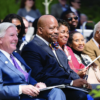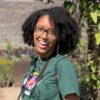On a Friday afternoon, on the University of Illinois Chicago campus, Zoë Harris—an Afro-Indigenous, second-year community health sciences doctoral student—sits in her office at the Native American Support Program and weaves a basket during her virtual spotlight interview. The scope of Harris’s graduate assistantship at the support program is far from new to her; her work and service with underrepresented students and communities trace back to her days at Northeastern University.
After completing Northeastern’s PlusOne program in 2021, Harris graduated with a master’s in public health. One year prior, she obtained a bachelor of science in health science with a minor in global health and business after studying in Boston, located in the same state as her hometown, Cape Cod. “When I first applied to school, I actually applied as a business major, and I knew that Northeastern had a pretty strong business program,” Harris says. She mostly applied to colleges in the New England area, wanting to stay close to home, but ultimately, she chose Northeastern because it felt right for her. “[Northeastern] was in the city,” she explains. “I lived in a rural environment for my entire childhood, so it was an urban environment, it was a place where none of my other high school peers were going, so it felt like a really good place for me to kind of start my adulthood, so to speak.”
Throughout her undergraduate and graduate careers at Northeastern, Harris says she was “pretty involved” at the John D. O’Bryant African American Institute (JDOAAI). She served as a secretary for the Northeastern Black Student Association (2017-2019), joined the Legacy Mentoring and Leadership Program as a mentor (2018) and senior mentor (2019-2021), became a Dr. Martin Luther King, Jr., Graduate Fellow (2021), and was a Sisters in Solidarity member. Off-campus, she tutored middle school children at the Mission Hill After School Program, was involved with the North American Indian Center of Boston, and more.
Harris refers to her time on NBSA’s executive board as a “labor of love.” She recalls co-hosting an event on self-care and mental health in the Black community, touching on imposter syndrome, microaggressions, and what causes poor mental health. At the end of the NBSA event, a first-year student told her he had felt all she spoke about—he just did not really have the language for it. He thought the event was the best general body meeting he had attended. Harris reflects, “It really … made it worth it because I think when you’re in undergrad, and you’re doing this underpaid labor, you’re like, ‘This totally sucks.’ But I think that it really opened a lot of doors for me in terms of learning how to do event planning, how to manage, how to work within higher education, and also helped me really gain those connections with [JDOAAI staff] as well.”
Harris was an experiential learner during her undergraduate career, completing two co-ops and working on two projects for the Bouvé College of Health Sciences Institute for Health, Equity, and Social Justice. Furthermore, she was a teaching assistant for a Dialogue of Civilizations program in Ghana and two Bouvé College of Health Sciences courses. Later, she would serve local urban Native populations: “During my final year of my master’s program, I worked with … an urban Indian Organization in Boston. I was their program assistant,” says Harris. At Native American Lifelines, Inc., along with other tasks, she provided tangible resources to Native communities during the COVID-19 pandemic: “We created these huge, 50-pound resource boxes that I drove all over the state of Massachusetts to give to Native families.” In Chicago, Harris remains involved with Native communities on campus, in the city, and nationally; she works closely with the American Indian Health Service of Chicago and the local American Indian Center and is also a public health associate for the National Council of Urban Indian Health. At the University of Illinois Chicago, she is president and co-founder of the Indigenous Graduate Student Association.
Harris says the first couple of months of her doctoral program were “very rough” for her despite receiving support from her program and mentor. She felt “lesser than” until she had dinner with students from minority communities, where they shared similar feelings as her. “What definitely helped my transition was just getting more involved and seeing what was out there,” she remarks. She later joined UIC’s School of Public Health committees, went to community events, and explored Chicago. The John D. O’Bryant African American Institute, back in Boston, had a big impact on Harris’s life—she is incredibly grateful for the Dr. Martin Luther King, Jr. Graduate Fellowship’s financial aid and the connections with the Institute staff. She notes, “I honestly think that the Institute has made me a better person.”



